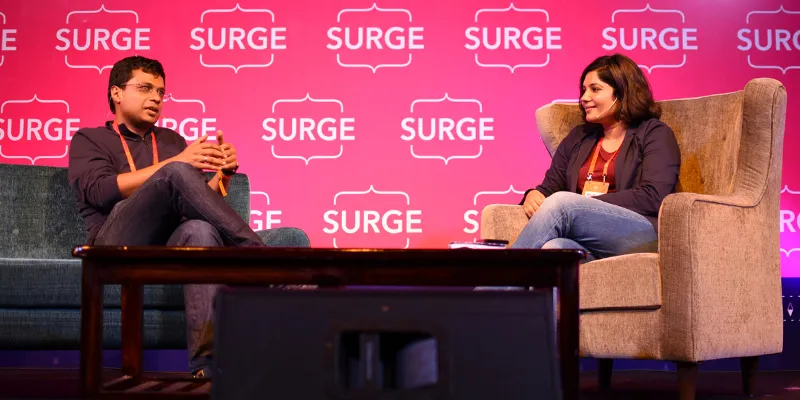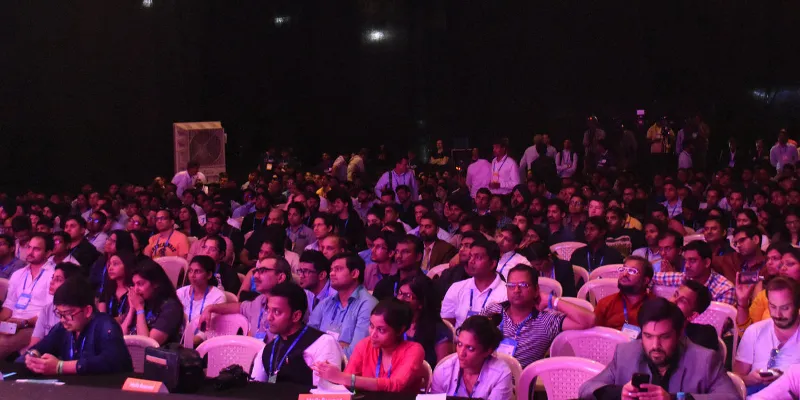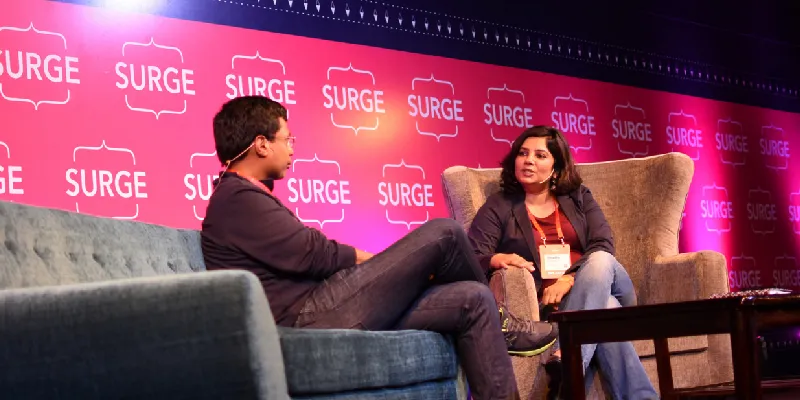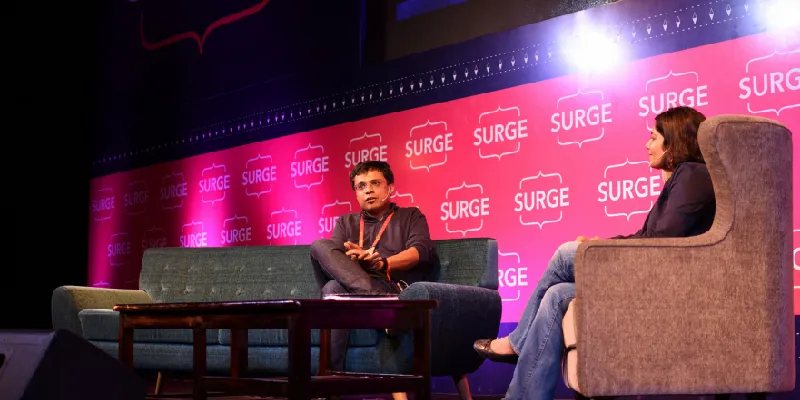Entrepreneurship pushes you beyond your limits, says Sachin Bansal of Flipkart
If there is one name that led to the birth of India’s new-age startup and e-commerce ecosystem, it is Flipkart. The brain child of Sachin and Binny Bansal, two friends from Chandigarh and alumni of IIT-Delhi, eight-year-old Flipkart is now part of the nine-member Indian Unicorn club with a valuation of $15.5 billion.
The last session at SURGE conference on Wednesday saw a hall packed with startup founders and those nursing hopes of starting up. The audience was there to listen to Sachin Bansal, Co-founder and Executive Chairman of Flipkart, in conversation with Shradha Sharma, Founder of YourStory. The attendees began queuing up an hour in advance and not a seat in the Centre Stage was empty. What ensued was a chat between two entrepreneurs on the challenges of building a company. In the candid conversation, peppered with laughter, Sachin spoke about building Flipkart, the importance of humility, of knowing your strengths and weaknesses, and the unique loneliness of being a startup founder.

Three right things
During the chat, Sachin spoke about the three things they did right, and what worked well for Flipkart.
“We were clear on whom we wanted to work with; so we set clear boundaries for ourselves. As a startup, it was hard to take that call,” said Sachin. Of course, Flipkart started in 2007-2008, when startups were not that “cool”. He added: “We could have easily said yes to the various people who were coming to us for various reasons. But we kept our resolve and it paid off.” He calls it the single-largest reason for their success.
Curiously, it was the same for investors too. “We were able to choose our investors, and whom we can partner with. We also set the right expectations with investors,” he added.
Sachin also stressed the importance of humility. “Keeping your ears and eyes on the ground is very important. When they said we were great, we had to make sure that it didn’t go to our heads. Not becoming arrogant was important for us.” He added that he never reads positive PR, but only criticism.
To be the right co-founder
He built a huge company, with massive success. What is his secret? “I am always open to change and learning. It’s easy to lose it, but I kept that attitude,” said Sachin. He believes that if you are a founder of a company, everything business is personal and vice versa. “Whatever you do in your personal life will have a huge impact on your business. There is no line in between. You can never switch off,” he added. Sachin’s advice to entrepreneurs is to keep their eyes and ears open. “Life is not black and white. When I see very positive or very negative stories about someone, I know it’s not as it is portrayed to be,” he says.
Known for being approachable, he says if you are not open, it would stop people giving you feedback, which will restrict your growth.
Alone at the top
When startups grow as organisations, is it difficult for the founder to detach and not be involved in micromanagement? In most startups, the key challenge – which Flipkart has done very well – is getting extraordinary people to lead the organisation.
“Binny and I were very clear from the beginning that we don’t know much except writing code for a large-scale distributor system,” Sachin says with a smile. “We knew we wanted people to come and help us so we gave a lot of autonomy from day one. In most cases, people delivered ten times for the company. It was the environment we created to nurture talent. Every employee has shaped the business because we gave the freedom to go ahead and change it.”
Apparently, the idea for their delivery service -Ekart- came from an intern. “When we trust someone, we let them do everything. We let him try it; so he hired 4-5 pizza delivery guys for Koramangala. The customer satisfaction was very good, and we extended to 20 cities in three months,” said Sachin.

They had never imagined the company would grow so big so soon, said Sachin about the beginning. “When we presented to Accel Partners, we thought we may become a $100 million company in five to ten years. As we started executing, we were digging a mine that just kept getting bigger and bigger. Our investors played a big role in making us realise that,” he reminisced. For Flipkart, it was an exploratory process that revealed itself over time.
Flipkart was one of the first companies to organise a Hackathon for its employees. “We are passionate about technology and computer science. Additionally, it is essential for the business to scale. A business of this nature cannot be run without having a platform where manual decisions are reduced as much as possible,” said Sachin about his investment in technology.
Does it get lonely at the top? To this question, Sachin’s immediate response was a strong yes. “Nobody can relate to what a founder goes through in the ups and downs of a business. But that’s how it should be. It pushes you beyond your boundaries and helps you grow.”
He added: “You have to constantly pull yourselves out of the minute details, and see whether you are heading in the right direction. If not, change that direction; learn from your mistakes, and move forward.”

The goal
Staying anchored is the bigger picture, said Sachin, about his goal. “We have a great opportunity to transform commerce for the whole country and make it better and we want to tap it. We have grown up here, we live here, and we want to bring a huge change in the way we live.”
One of the most awaited talks at the conference, it offered a lot of takeaways for the audience. Sachin was also game for Shradha’s rapid fire round. He responded in a single sentence, what each word meant to him.
Startup: Transformation and energy
Failure: Learning and no regrets
Funding: One of the means to the end
Media: Ignore (Ouch!)
Naysayers: Keep you on your toes, are important
Team: Your family
Investors: If you set the right expectations, they can be force multipliers
Happiness: What is the problem you are trying to solve, and how far you have reached in it?
And, to the final question of what ‘Flipkart’ meant to him, Sachin’s answer was a simple: “My child.”








